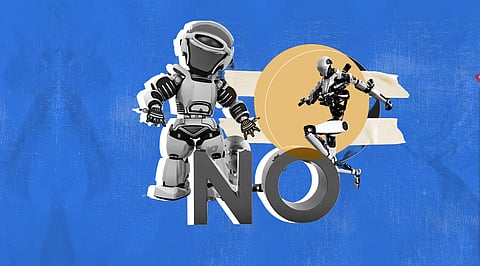

AI model backlash hits and focused on the wrong things from human-like chats to coding AI algorithms spinning up the software to image generators spewing continues to grow in influence.
The reaction began with thousands of engineers and scholars, led by billionaire Elon Musk, signing an open letter warning of profound risks to humanity and asking for a six-month moratorium on AI model development. A non-profit AI study organization has submitted a protest with the Federal Trade Commission, requesting that the FTC examine OpenAI, the San Francisco start-up behind ChatGPT, and stop further commercial releases of its GPT-4 software. Authorities in Italy have blocked ChatGPT entirely, citing data protection breaches.
Artificial Intelligence apps that seemed implausible, if not unfathomable, just a few years ago are now quickly invading social media, classrooms, workspaces, and even politics. Some see a line leading to computer rulers and the extinction of humanity in the dizzying trajectory of change.
The good news is that both the hype and worries surrounding all-powerful AI are largely exaggerated. Google Bard and Microsoft Bing, as impressive as they are, are a long way from Skynet. The bad news is that concern about the rate of change may be justified as well not because AI will outwit humans, but because humans are already using AI to outsmart, exploit, and short-change one another in ways that established institutions aren't equipped for. And the more AI is viewed as strong, the more likely it is that individuals and corporations will entrust it with duties for which it is unprepared. Put away the doomsday predictions and turn instead to a pair of studies released last week one by Goldman Sachs on the technology's economic and labor impacts and another by Europol on its potential for criminal misuse.
However, cheaper and more effective does not always imply better, as anyone who has used a supermarket self-checkout machine, automatic phone answering system, or customer support chatbot can testify. And what distinguishes generative AI from previous generations of automation is its ability to imitate humans, even pose as humans in certain situations. This will allow widespread deceit as well as entice companies to consider humans as replaceable by AI even if they aren't. According to Goldman Sachs' study, generative AI will affect 300 million jobs globally, displacing tens of millions of people while also driving substantial economic development. Take the headline numbers with a grain of salt; Goldman Sachs projected in 2016 that virtual reality devices would become as commonplace as Mobiles.
The study takes an upbeat tone, estimating that this iteration of AI could increase global GDP by 7% as companies get more out of employees who grasp it. However, it is expected that approximately 7% of Americans will have their jobs rendered obsolete as a result of the process, and many more will have to adjust to the technology to stay employable. In other words, even if generative AI is successful, the consequences could include the eviction of large groups of workers and the slow substitution of human features in the workplace and everyday life with bots.
Join our WhatsApp Channel to get the latest news, exclusives and videos on WhatsApp
_____________
Disclaimer: Analytics Insight does not provide financial advice or guidance on cryptocurrencies and stocks. Also note that the cryptocurrencies mentioned/listed on the website could potentially be risky, i.e. designed to induce you to invest financial resources that may be lost forever and not be recoverable once investments are made. This article is provided for informational purposes and does not constitute investment advice. You are responsible for conducting your own research (DYOR) before making any investments. Read more about the financial risks involved here.
